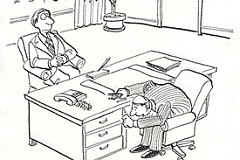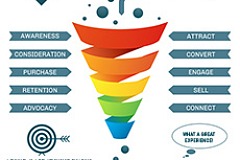 We Only Focus on Things That Are of Value or A Threat to Us!
We Only Focus on Things That Are of Value or A Threat to Us!
Lou Tice, co-founder of the Pacific Institute and a mentor of mine, told a story of a mother, sound asleep with an infant. Although the mom is surrounded by noise and partying and honking horns, she sleeps right through everything.
But when the infant that's lying next to her makes the slightest whimper, the mother wakes up. It wasn't the loudness of the noise but rather the value of the child and perhaps the threat of danger to the child that roused her.
Why this is important?
This is important because we all have the same ability as the mother. We think things that happen in our lives are coincidences many times when they really are not a coincidence. It's the Reticular Activating System or RAS.
Experts determined if you set a goal for something you want, you create a mental image of the desired outcome. In doing so, you automatically trigger a seed of thought into the RAS. [quotesright]We are unaware at the conscious level of the thought, but in our subconscious it’s getting attention! [/quotesright]
To explain this in easier terms perhaps the following examples will help. I am sure that you'll be able to relate to one of them since something it likely has happened to you in your life at some point.
- Thinking back over your life of owning a vehicle, have you ever bought a new car? It doesn't have to be brand new, just newer than what you had before.
Maybe you thought it was so unique and different than any others out there, but while you're enjoying driving your new car around town; all of a sudden seemingly out of the blue there's one, there's one, and here comes another one.
[quotesright]Where did they all come from, were they there before? [/quotesright] They were always there but you didn't see them because they weren't important to you. You have a heightened awareness due to your RAS and how it functions. Have you had a similar experience in your lifetime?
- A friend of mine was telling me about a time during a hurricane when the storm blew out his refrigerator and stove. He remembered it that week when he was talking with his wife. He pointed out to her that the newspapers were full of ads for appliance sales. His wife said, really, those ads are in there every day.
Up until then he had never noticed the appliance ads in the newspaper. Why? Because they weren’t important before the hurricane but now were because he needed a new refrigerator for their food.
[quotesright]Things like that are there all of the time but unless they are of value to us they don't register.[/quotesright] it's like we have a scotoma, a blind spot.
So what, who cares and what does that have to do with anything?
It turns out that the more you set goals that are clear and concise – especially in writing such as in a journal – the goal images are absorbed into your RAS, unbeknownst to you. Suddenly you have these, aha moments, intuitive thoughts, and you may even experience a deja vu feeling. Suddenly, you are seeing it everywhere it comes up.
It’s because you magically seem to have a heightened awareness, a focus on the thought that has been triggered by how you set and reinforced your goals.
This is a great example and is very applicable to the power and significance of having goals or a purpose.
The following example comes from Pete Carroll's desire for "A Better LA." It's one of my favorite stories because it was a story about Pastor John and Pete working in Los Angeles’ inner cities with their gangs. Here is an abridged version using the vernacular of the street as in the complete version:
Coach Carroll was great and we were traveling around. At the time, we were working with inner city kids and this really hit home. So, uh, so I haven't been down there for quite a while and I've been traveling around with the pastor of a church down there, Pastor John.
Pastor John was talking about Raphael a Mexican American kid who’d just got out of the joint and how Raphael was progressing, he comes by the other day, says he needs a job.
Pastor John said, “I'd love to give you a job, but we don't have the money to hire another person right now. But I'll tell you what, if you go in and shred some papers today, I'll pay it for today and we'll keep an eye out on a job for you.” Raphael said, “Hey, Pastor John man, that's great.”
Later that day Raphael comes up and says, “Hey, Pastor John man, I really need to get to my Probo's office downtown, could I get a ride from you?” Pastor John says, “I happen to be headed there, but next time you're going to want to plan ahead to get there, but I'll take you this time, I'm going to be leaving about 3:30 come find me.”
Raphael joins up with Pastor John and immediately gets into the car, Raphael does the low rider thing. [quotes]He slides down in his seat, down to where just his face is appearing over the lower part of the windows. [/quotes]
As they start driving, Pastor John notices, Raphael’s getting all agitated and asks, “Are you okay?” Raphael says I'm okay, just keep driving. Pastor John noticed Raphael starting to perspire now and he's going, holy cow he's worried that he's going to have a heart attack.
Pastor John pulls up to the courthouse and he turns to Raphael and asks him, “Are you sure you’re okay?”
Raphael says, “Pastor John, man somethings going down!” Pastor John asks, “What do you mean something's going down?” Raphael said, “When we were driving here, did you see those un-marked police cars coming this way and then behind the liquor store there were three cop cars and one behind the grocery store?”
Pastor John said, “No Raphael I didn't see those at all.” Raphael said, “Yea man something’s gone down.” Pastor John said, “Hey Raphael, did you happen to see the sign on that liquor store help wanted and on the grocery store they had a sign advertising for a job too.” Raphael said “No, I didn't see that.”
That's a real-life example of the RAS, your Reticular Activating System in action.
There are a couple of things that I have discovered around the RAS, one is that when we have a challenge or a problem, many of us focus on the problem or challenge
[quotes]What most people focus on is the problem.[/quotes] Think about that for a minute, humans are teleological in nature, meaning we become what we think about most of the time; we're going to move towards what we think about. Teleologic is like a guided missile that is set on a course that self corrects along the route.
Think about the reticular activating system and how it works: It is going to show you things you don't really need to see with respect to how bad the problem is. This is very subtle. When you have a problem, you want to solve the damn thing, so your first tactic is to consciously figure out “How do I deal with this?” You keep thinking about the problem and how you are going to deal with it [quotesright]You think how are you going fix it. This can work, but there is a better, quicker, and less stressful way. [/quotesright]
The better way is to think about a solution, not how to deal with the problem. [quotes]This is a very subtle shift in your focus.[/quotes] From now on, when you have a problem instead of focusing on it, shift your thinking to what the solution could be to remove the need to cope with the problem.
Here’s an example of how this works.
Working with a coaching client, I asked him “What's the problem?” He told me what the problem was in emotionally packed details. Then I asked him “What's your solution?” He said he didn't know, he didn't have a replacement picture of an ideal outcome.
I said “Get a piece of clean paper and on the top and write the following question, “What would the ideal outcome look like and feel like fixed?” Don’t write sentences, give me words.” He was really struggling and said, “If I knew how, I would solve it.” I said I know that you don't know yet. I also knew that he didn't know about the RAS.
This exercise is a great way to strategically give information to your RAS just by writing trigger words. Here's the interesting thing most people don't know: When facing a problem, they should think about what solving it would feel like.
If you write, what does it feel like or what did you like, the RAS is so amazing that it will effortlessly get you started, focused on a solution, and no longer focused on the problem.
Approaching a problem this way helps remove stress, which simply kills energy and creative thinking about solutions. Pretty soon you’ll be saying, “I can do this, I could do that”. It's not magic, it's mental technology. Here's the key: If you try hard to find the answer, it doesn't work. Why? Because your conscious mind does not like to be coerced, it pushes back.
[quotesright]When your conscious pushes back it’s saying, “I don't like to be coerced.” [/quotesright]The brain works 24-7 in the your subconscious to avoid pain at any cost while looking for pleasure.
That’s the key. In anything you're about to do if you could see a slight smidgen of pleasure, you might do it, but if it comes across as pain, you won't, and if you try hard to find a solution, you pushback.
If you just relax and let it go, that’s what causes the RAS to go, click, click, click, click and start looking for ways to reach that pleasurable end state.
Imagine your RAS, it's like a computer when you're looking for a file, comparing bits and pieces, looking everywhere for the answer.
Staying in a relaxed state of mind rather than trying harder allows the creative subconscious mind to come up with a solution; remember that we’re teleological by nature.
You're in a deep sleep until bang, all of a sudden, it's 3 a.m. and you just woke up with a great solution. Your subconscious mind doesn't care if you're asleep, it doesn’t need sleep and it is going to give you an answer. [quotesright]It’s driven to keep going and come up with something. [/quotesright]
When that happens, make sure you write it down. Sometimes when it comes, it’s complete, and sometimes it’s just pieces. Some people think that it's magic. It's not magic, it’s just using your brain power productively by leveraging your RAS
Sometimes someone will say, “Ah, you haven't got that problem solved?” [quotesright]You say, let me sleep on it. [/quotesright]
We already know it's built in, but this is a user's guide that tells you how to cause that to happen, how to leverage your RAS.
Let’s finish the story of Pastor John and Raphael. If you’ll recall, Raphael said he wanted a job and he didn't see any of those help wanted signs. All he saw were the cop cars and stuff because his subconscious was conditioned to see cop cars. That had been his life up to that point. Even though Raphael said he wanted a job, he was blind to those signs because he saw threats, not opportunities at a subconscious level.
Raphael was finally able to get a job. He got out of the gangs and trouble and has stayed out. Once he learned how to focus on the pleasurable outcomes and let his RAS go to work on solutions, he didn’t need Pastor John to do the job hunting for him. Raphael started seeing jobs for himself.
[quotesright]There's a difference between goal stating, and goal setting. [/quotesright] Stating the goal is good; setting the goal in terms of the rewards of solving is better because it brings in the science behind RAS. Now you know how to state problems in terms of desired outcomes and turn your mental machinery loose on giving you solutions.
When we are working with our clients and with ourselves, we need to help them and ourselves determine the starting point. You know the line in the sand, the desired end result, the outcome, and the reason why.
[quotesright]The more clarity that is created about the desired outcome is what engages the RAS to do its job. [/quotesright] Since our mind does its best work when we’re in a relaxed state of mind, state the problem in terms of desired outcomes and stop trying so hard, trust your subconscious mind to serve up the solutions.
by Phil Gilkes














